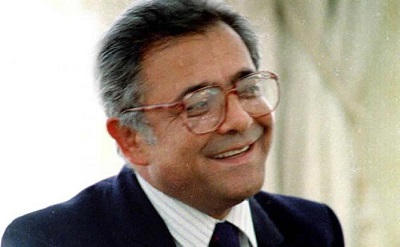26th anniversary of Kazem Rajavi’s assassination by Iran’s regime
Sunday, 24 April 2016/NCRI
Sunday, April 24 marks the 26th anniversary of the assassination of Professor Kazem Rajavi, a renowned defender of human rights in Iran and elder brother of Iranian Resistance leader Massoud Rajavi, by a terrorist hit squad of the mullahs’ regime. At the age of 56, Prof. Kazem Rajavi held six doctorate degrees in the fields of law, political science, and sociology from the universities of Paris and Geneva. In 1971 he established the Swiss Society for Defense of Iranian Political Prisoners with the help of a resident of Geneva by the name of Christian Grobet who later became head of government advisors during the years 1986 to 1993. Kazem’s younger brother Massoud Rajavi had been condemned to death on political charges by the Shah. Kazem succeeded in commuting the sentence to life in prison. He was Iran’s first Ambassador to the United Nations headquarters in Geneva following the 1979 revolution. Shortly after his appointment, he resigned his post in protest to the “repressive policies and terrorist activities of the ruling clerics in Iran.” He then intensified his campaign against mass executions, arbitrary arrests, and torture carried out by Iran’s theocratic leadership. He became the representative of the main opposition coalition National Council of Resistance of Iran (NCRI) in Switzerland and at the UN in Geneva. In Geneva he was also a university professor. His resolve in the struggle against the new regime that systematically trampled upon human rights led to the appointment of a UN Special Rapporteur for Iran and the first resolution on Iran at the UN Commission on Human Rights in Geneva. Dr. Rajavi had been threatened with his life. In the hall of the UN Headquarters, a diplomat-terrorist of the regime once shouted at him: “We will kill you!”In 1986, then-Supreme Leader of the mullahs’ regime Ruhollah Khomeini issued a fatwa for Dr. Rajavi to be killed. On 24 April 1990, he was gunned down in broad daylight by several agents of the Iranian regime’s notorious Ministry of Intelligence and Security (MOIS) as he was driving to his home in Coppet, a village near Geneva. Dr. Rajavi’s assassination required enormous resources, extensive planning, and coordination among several of the regime’s organizations. After extensive investigations, Roland Chatelain, the Swiss magistrate in charge of the case, and Swiss judicial and police officials confirmed the role of Iran’s government under Ali Akbar Hashemi Rafsanjani and the participation of thirteen official agents of the Iranian regime who had used “service passports” to enter Switzerland for their plot. Swiss magistrates later issued an international arrest warrant for a former Iranian intelligence minister, Ali Fallahian. Fallahian and 13 Iranian diplomat-terrorists are wanted on charges of murdering Dr. Rajavi.
IRAN: Ailing political prisoner shown support from ex-Tehran University chancellor
Sunday, 24 April 2016/NCRI
Iranian physicist and political prisoner Omid Kokabee who underwent surgery last week to remove his cancerous right kidney has been given moral support by the former chancellor of the University of Tehran. Mr. Kokabee, 34, and his relatives had repeatedly warned about his various problematic health conditions, but the mullahs’ regime systematically ignored their warnings in the past five years that he has been behind bars. Human rights groups say Mr. Kokabee is a prisoner of conscience held solely for his refusal to work on military projects in Iran and as a result of spurious charges related to his legitimate scholastic ties with academic institutions outside of Iran. Following Mr. Kokabee’s surgery last Wednesday, Dr. Mohammad Maleki, the first post-revolution Chancellor of Tehran University, in a video message denounced his “inhumane” detention, which goes against “human rights.”Dr. Maleki urged young Iranians to “rise up and protest” such detentions of Iranian academics and university students by the mullahs’ regime. Mr. Kokabee had been pursuing post-doctoral studies in the United States when he was arrested in January 2011 when he went to Iran to visit his family. He was held in solitary confinement for 15 months and was subjected to prolonged interrogations, and pressured to make “confessions.”In May 2012, after an unfair trial in the regime’s so-called Revolutionary Court at which it is understood that no evidence was presented against him, he was sentenced to 10 years in prison for having “connections with a hostile government,” according to Amnesty International. His sentence was upheld on appeal in August 2012.According to human rights groups, Iranian authorities unduly delayed Mr. Kokabee’s access to medical treatment in the past. In 2012, after an initial examination found that he had a tumor, Mr. Kokabee experienced a long delay in getting permission to be transferred from a prison health clinic to a hospital for critical medical examinations. In an open letter written from prison in April 2013, Mr. Kokabee said: “During interrogations which were conducted in solitary confinement, while all my communication with my family and the outside world was cut off, and while I was constantly being put under pressure and threats by receiving news about the horrible physical and mental state of my family, I was asked again and again to write up various versions of my personal history after 2005.”Omid Kokabee has also said that since he graduated from university in 2005 he had been “invited several times to work as a scientist and technical manager for military and intelligence projects.” This included being offered admission to a PhD program with full sponsorship by the Atomic Energy Organization of Iran. He declined all invitations. Mr. Kokabee was awarded the Andrei Sakharov Prize by the American Physical Society in 2013, for “his courage in refusing to use his physics knowledge to work on projects that he deemed harmful to humanity, in the face of extreme physical and psychological pressure.”
http://www.ncr-iran.org/en/news/human-rights/20238-iran-ailing-political-prisoner-shown-support-from-ex-tehran-university-chancellor





















